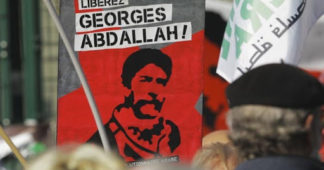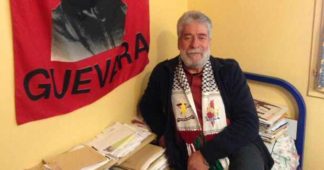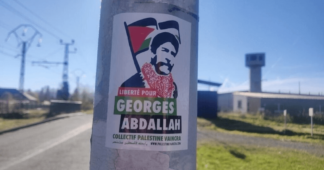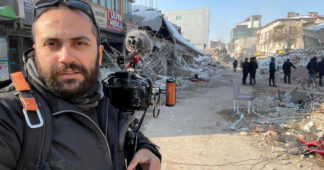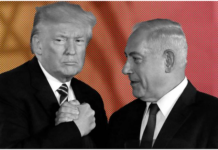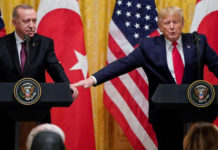The court issued the release order after Abdallah had spent 40 years in French prisons despite continuous worldwide protests calling for his freedom.
November 16, 2024
A French court ordered the release of prominent anti-imperialist and pro-Palestinian Lebanese freedom fighter Georges Ibrahim Abdallah on Friday, November 11. As per the order, Abdallah would be released on December 6, provided that he leaves France and never returns. Speaking to Agence France-Presse (AFP), Abdallah’s current lawyer Jean-Louis Chalanset described his client’s release order as “a legal and a political victory.”
The decision has been long-awaited by leftist activists, advocates, and human rights organizations worldwide. However, on Friday, the French “anti-terrorism” prosecutor announced that it would appeal the decision to release Abdallah.
Who is Georges Abdallah and why is he considered a political prisoner?
Georges Ibrahim Abdallah was born in Qoubaya village in northern Lebanon in 1951. His political activism began in the 1970s as a sympathizer with the pro-Palestinian and Arab nationalist circles. In 1978, Abdallah was wounded during Israel’s invasion of Lebanon, the year during which he joined the Popular Front for the Liberation of Palestine (PFLP).
In the late 1970s, Abdallah founded the Lebanese Armed Revolutionary Factions (LARF), which claimed responsibility for four attacks against American and Israeli officials in France in the 1980s. The assassinations of US military attache Charles Robert Ray, and Israeli diplomat Yacov Barsimantov in the French capital Paris in 1982, were among these attacks, for which Abdallah would later be convicted.
In 1984, Georges Abdallah was arrested by the French authorities by coincidence after the French police discovered that he was carrying forged Algerian and Maltese passports.
In response to Abdallah’s imprisonment, the LARF captured French diplomat Sidney Gilles Peyroles in Tripoli city in northern Lebanon on March 23, 1985. France reportedly entered into secret negotiations to swap Abdallah for Peyroles through Algeria. The LARF accepted the deal and the diplomat was released after thirteen days.
However, one day after Peyroles was released, and as Abdallah was still held in detention, the French police raided an apartment rented by one of Abdallah’s friends, alleging that it was used as a hideout by LARF in Paris. The police then claimed that they discovered the weapon used in the killing of Ray and Barsimantov, and charged Abdallah of being directly connected to the two killing incidents, as the apartment rent was paid for via a Swiss bank account under one of Abdallah’s aliases.
In 1986, Abdallah was convicted of criminal association and possession of arms and forged documents. Consequently, he was sentenced to four years in prison.
In 1987, Abdallah was convicted for his alleged role in assassinating Ray and Barsimantov and sentenced to life in prison. It is widely believed that the harsh punishment of Abdallah is due to his leading role in LARF and pressure exerted by US and Israeli authorities on France.
Advocates have long pointed out the glaring irregularities in his case and the deeply unjust nature of his conviction and 40-year imprisonment. The evidence used to convict Abdallah is said to have been fabricated retroactively by French, American, and Israeli intelligence services. Furthermore, years after the trial, French lawyer Jean-Paul Mazurier admitted that he had worked as a spy for the French intelligence services while defending Georges Abdallah.
Although Abdallah completed the minimum portions of his life sentence in 1999 and has become eligible for requesting parole ever since, successive requests were rejected by the court. In 2013, Abdallah was granted a release order provided being deported from France, but the then Interior Minister Manuel Valls refused to implement the order. Valls’s refusal reaffirmed that Abdallah’s imprisonment was at the first place based on political grounds.
When Wikileaks released the private emails of former US Secretary of State Hillary Clinton, it was revealed that in a phone call with former French Foreign Minister Laurent Fabius regarding Abdallah’s case she said, “Although the French Government has no legal authority to overturn the Court of Appeal’s January 10 decision, we hope French officials might find another basis to challenge the decision’s legality.”
Georges Abdallah’s influential struggle against imperialism and Zionism
Georges Abdallah has been viewed by his supporters all over the world as an embodiment of resistance and resilience, as he has never accepted to surrender to the French, Israeli, and American pressure.
Abdallah’s immortal words before the judges during his trial in Lyon in 1987 have for decades been resonating in the conscience of his supporters. “I am a fighter, not a criminal. The path I have followed has been imposed on me by the human rights abuses perpetrated against Palestinians,” Abdallah proudly said.
Deputy General Secretary of the Jordanian Democratic Popular Unity Party (known in Jordan as Wihdah Party), Dr. Issam Khawaja, venerated the lengthy anti-imperialist and anti-Zionist struggle of Georges Abdallah. “The engagement of an Arab Lebanese freedom fighter like comrade Georges Abdallah with the Palestinian resistance movement came in a natural context, which represents the organic connection between Arabism and Palestine as an identity and a title of the struggle against imperialism and Zionism, and their colonial occupation-based projects,” he said.
“This case is not deemed exceptional or exclusive, as it has not started with Georges Abdallah and did not end after him. What Georges did was based on his intellectual and political beliefs and the approach to which he was affiliated that was rooted in the launch of Arab nationalism and its different movements in the middle of the past century,” Dr. Issam added.
Dr. Issam asserted that “the most significant among all these movements is the Arab nationalist movement and its extensions that were founded on the basis and concept that revived their urgency in the status quo. The concept, which provides that Arab unity is the path to liberating Palestine and the Arab nation from the hegemony of the imperialist, Zionist, expansionist project under the title of ‘New Middle East’, and the terms used by Netanyahu and different US Administrations during the last decades.”
Dr. Issam pointed out that “Georges recognized that the way for confronting and defeating the Zionist hegemony and its occupation project, is necessarily connected to fighting the imperialist powers and all their components and extensions, as they play the role of patrons, protectors and guarantors of the Zionist project and its entity, i.e. the occupation state of ‘Israel’. Abdallah’s recognition and awareness of this issue were interpreted in real actions and practices that led to his arrest, giving him the harshest punishment sentences, and renewing them because he became a symbolic figure for subsequent generations of our Arab nation.”
We remind our readers that publication of articles on our site does not mean that we agree with what is written. Our policy is to publish anything which we consider of interest, so as to assist our readers in forming their opinions. Sometimes we even publish articles with which we totally disagree, since we believe it is important for our readers to be informed on as wide a spectrum of views as possible.
